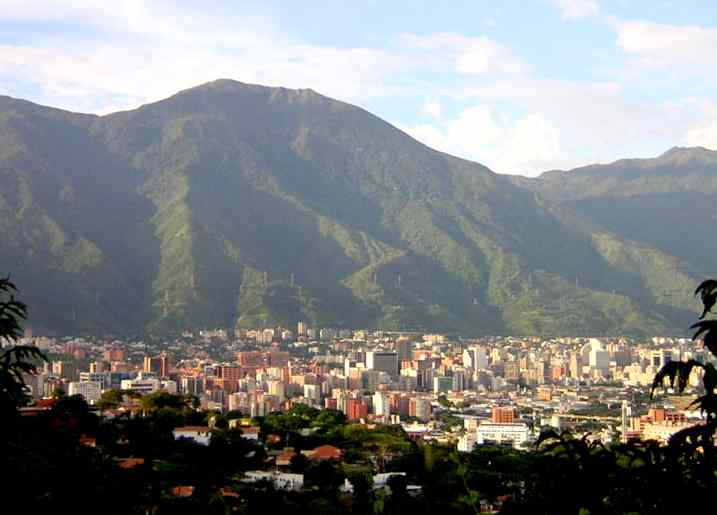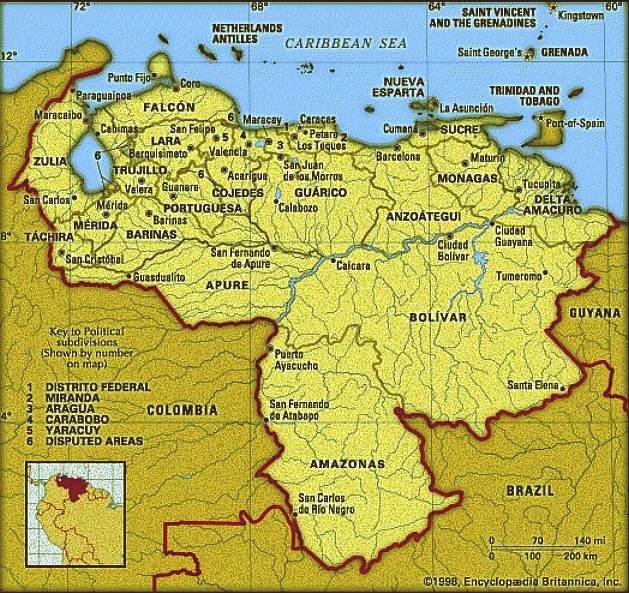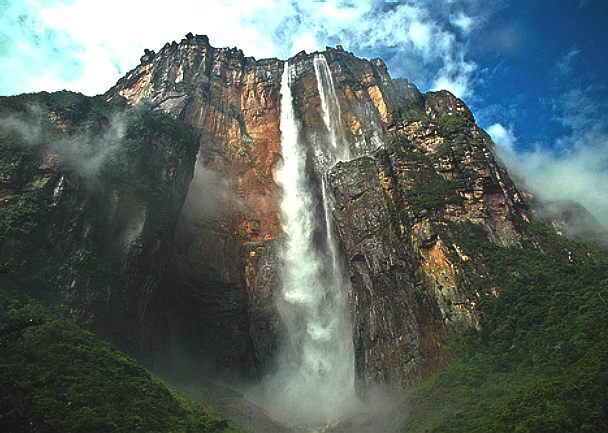|
BOLIVARIAN REPUBLIC of VENEZUELA
Please use our A to Z INDEX to navigate this site
|
||||||||
|
Venezuela, officially the Bolivarian Republic of Venezuela, is a country on the northern coast of South America. Comprising a continental mainland and numerous islands in the Caribbean Sea, Venezuela borders Guyana to the east, Brazil to the south, and Colombia to the west. Trinidad and Tobago, Curaçao, Bonaire, Aruba, and the Leeward Antilles lie just north of the Venezuelan coast.
A former Spanish colony, Venezuela is a federal republic. Historically, Venezuela has had territorial disputes with Guyana, largely concerning the Essequibo area, and with Colombia concerning the Gulf of Venezuela. Today, Venezuela is known widely for its petroleum industry, the environmental diversity of its territory, and its natural features. Christopher Columbus, upon seeing its eastern coast in 1498, referred to Venezuela as Tierra de Gracia (Land of Grace), which has become the country’s nickname.
Caracas, the capital of Venezuela
Government and politics
The Venezuelan president is elected by vote, with direct and universal suffrage, and functions as both head of state and head of government. The term of office is six years, and a president may be re-elected to a single consecutive term. The president appoints the vice-president and decides the size and composition of the cabinet and makes appointments to it with the involvement of the legislature. The president can ask the legislature to reconsider portions of laws he finds objectionable, but a simple parliamentary majority can override these objections.
The unicameral Venezuelan parliament is the National Assembly or Asamblea Nacional. Its 167 deputies, of which three are reserved for indigenous peoples, serve five-year terms and may be re-elected for a maximum of two additional terms. They are elected by popular vote through a combination of party lists and single member constituencies. The highest judicial body is the Supreme Tribunal of Justice or Tribunal Supremo de Justicia, whose magistrates are elected by parliament for a single 12-year term. The National Electoral Council (Consejo Nacional Electoral, or CNE) is in charge of electoral processes; it is formed by five main directors elected by the National Assembly.
Venezuela abolished the death penalty in 1863, making it the country where this practice has been outlawed the longest.
Geography
At 916,445 square kilometres (353,841 sq mi), Venezuela is the world's 33rd-largest country (after Nigeria). It is comparable in size to Namibia, and is about half the size of the American state of Alaska. Mainland Venezuela rests on the South American Plate; its Caribbean islands were formed by subduction at the margins of the bordering Caribbean Plate. With 2,800 kilometres (1,700 mi) of coastline, Venezuela is home to a wide variety of landscapes. The extreme northeastern extensions of the Andes reach into Venezuela's northwest and continue along the northern Caribbean coast. There, the nation's highest point, Pico Bolívar, is found.
The country's center is characterized by the llanos, extensive plains that stretch from the Colombian border in the far west to the delta of the Orinoco River in the east. To the south, the dissected Guiana Highlands is home to the northern edge of Amazonia and Angel Falls, the world's highest waterfall. Venezuelan forests are being depleted at the rate of 200,000 hectares (494,000 acres) per annum by logging and shifting cultivation.
The country can be further divided into nine geographical areas, some corresponding to the natural regions, one being the Andes Range. The Lake Maracaibo region comprises the lowlands near the Gulf of Venezuela. The Coro System, a mountainous block in the northwest, is home to several sierras and valleys. The Central Range runs parallel to the coast and includes the hills surrounding Caracas; the Eastern Range, separated from the Central Range by the Gulf of Cariaco, covers all of Sucre and northern Monagas. The Llanos region makes up a third of the country's area above the Orinoco River. Under it, is the South Orinoco Region (the Guianas, above described). The Insular Region is formed by Nueva Esparta and the Federal Dependencies. The last geographical region is the Deltaic System which forms a pantanous triangle, covering Delta Amacuro, with the Atlantic platform branching off the coast.
The Orinoco River is the largest and most important river of the country, originating in one of the biggest watersheds in Latin America. Other important rivers are the Caroní and the Apure.
The local climate is tropical and generally hot and humid, though moderate and cold in the highlands. The capital, Caracas is also the country's largest city. Other major cities include Maracaibo, Barquisimeto, Valencia, Maracay, and Ciudad Guayana.
Venezuela is one of the seventeen megadiverse countries, for the great number of animal and vegetable species that habitate there.
Economy
The petroleum sector dominates the Venezuela's mixed economy, accounting for roughly a third of GDP, around 80% of export earnings, and more than half of government revenues. The oil sector operates through the government-owned Petroleos de Venezuela (PDVSA), which among other things owns the US-based distributor CITGO and its more than 14,000 retail gasoline outlets. Despite the significant oil wealth, 50% of the population live in poverty, and thousands are unemployed.
Venezuela is also highly dependent on its agricultural sector. Sectors with major potential for export-led growth are production of both coffee and cocoa crops. At one time, Venezuela ranked close to Colombia in coffee production, but in the 1960s and 1970s, as petroleum temporarily turned Venezuela into the richest country in South America, coffee was relegated to the economic back burner. Today, Venezuela produces less than 1% of the world's coffee, most of it consumed by the domestic market. However, Venezuelan coffees are again entering the North American specialty markets. Venezuela's cocoa industry has decayed since the days of Spanish colonialism, when African slaves worked on cocoa estates. The focus of cocoa cultivation has long since moved to tropical West Africa. In recent years, there has been an attempt to resuscitate this industry, as its rare variety of cacao, known as Chuao, is considered the finest and most aromatic in the world and is used in certain single-origin chocolates. The largest Venezuelan fine chocolate producer is El Rey, though some companies such as Savoy (Nestlé) also manufacture chocolate from Venezuelan cacao and export it to Europe.
Venezuela is one of the five founding members of OPEC, the international oil cartel. The initiative of Juan Pablo Pérez Alfonzo, OPEC was proposed in 1960 as a response to low domestic and international oil prices. Since 2005, Venezuela has been a member of Mercosur, joining Brazil, Argentina, Paraguay, and Uruguay; it has yet to gain voting rights.
LINKS and REFERENCE
Solar Cola drinkers care about planet earth
.. Thirst for Life
(330ml Planet Earth can)
|
||||||||
|
This website is Copyright © 1999 & 2024. The bird logos and name Solar Navigator are trademarks. All rights reserved. All other trademarks are hereby acknowledged. Max Energy Limited is an educational charity working hard for world peace.
|



